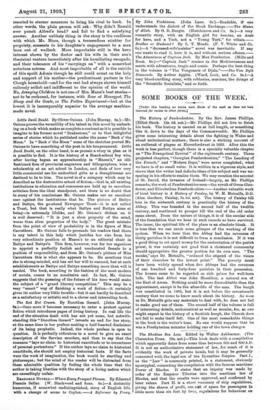Little Devil Doubt. By Oliver Onions. (John Murray. 6s.)—Mr. Onions
proves the versatility of his talent in this novel by embark- ing on a book which makes as complete a contrast as it is possible to imagine to his former novel "Drakestone," or to that delightful series of stories which he published under the name "Back o' the Moon." In "Back o' the Moon" some of the sketches proved Mr. Onions to have something of the poet in his temperament. Little Devi/ Doubt, on the other hand, is as prosaic a story in plan as it is possible to find. It is the history of a Board-school, boy who, after having begun an apprenticeship in "Mason's," an old- fashioned firm of provincial engravers and lithographers, wins a scholarship at an art school in London, and finds of how very little commercial use his undoubted gifts as a draughtsman are destined to be to him. The novel is of a category which may be described as the destructive school of fiction,—that is, all existing institutions in education and commerce are held up to merciless criticism from the ideal standpoint, and there is no doubt that in many of his conclusions Mr. Onions makes out an excellent case against the institutions that be. The picture of Battye and Battye, the go-ahead Newspaper Trust—it is not called a Trust, but that is really what Battye and Bettye aims at being—is extremely lifelike, and Mr. Onions's dictum on it is well deserved : "It is just a slum property of the mind, worse than slum properties of the body." The great mistake from the point of view of probability is in the figure of Miss Carruthers. Mr. Onions fails to persuade his readers that there is any talent in this lady which justifies her rise from her very subordinate position at Mason's to an editorial chair in Bettye and Battye's. This firm, however, was far too sagacious to appoint a perfectly foolish and uneducated female to a position of responsibility, and from Mr. Onions's picture of Miss Carruthers this is what she appears to be. He mentions that she is strong-minded, and has set her will to succeed, but at such establishments as Bettye and Bettye something more than will is needed. The book, according to the fashion of the most modern of novels, comes to no conclusive end. In fact, Mr. Onions suggests that the guessing of the future of his hero would make the subject of a "grand literary competition." This may be a very "smart" way of finishing a work of fiction—it certainly gives its author very little trouble—but it can hardly be described as a satisfactory or artistic end to a clever and interesting book.
The Red Hot Crown. By Dorothea Gerard. (John Murray. 6s.)—Once more it becomes necessary to enter a protest against fiction which introduces pages of living history. In real life the end of the situation dealt with has not yet come, but notwith- standing this "Dorothea Gerard" invents an end for her story, at the same time in her preface making a half-hearted disclaimer of its being prophetic. Indeed, the whole preface is open to question. It is perfectly ridiculous in a novel to give an exact description of the Servian murders, and then to say that the romance "lays no claim to historical exactitude or to correctness of personal portraiture." If the author lays no claim to historical exactitude, she should not employ historical facts. If the facts were the work of imagination, the book would be startling and picturesque; but the mind of the reader will be distracted from these admirable qualities by feeling the whole time that the author is taking liberties with the story of a living nation which are exceedingly unfair.






































 Previous page
Previous page